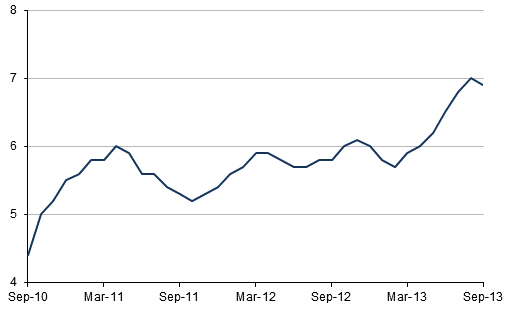While the upcoming German elections are getting limited coverage by the press outside of Europe, it is quite an important event. The Eurozone’s structure going forward to a large extent depends on Germany’s leadership. From the EMU banking union to Portugal’s debt restructuring – there is no shortage of extremely difficult problems to solve.
And the Eurozone is in a way quite lucky because the union of Germany’s two key conservative parties – Christian Democratic Union (CDU) and Christian Social Union of Bavaria (CSU) – under Angela Merkel are likely to return to power on Sunday. That will provide the much needed continuity/stability to the area in order face some of the daunting challenges.
The reason Angela Merkel will be reelected is simple. It goes back to James Carville’s “it’s the economy, stupid” that helped Bill Clinton win the presidential election in the US. Germany’s economy has been incredibly resilient through the euro area recession and is now showing signs of strength. The nation’s unemployment rate is at the lowest level in at least 20 years.
Consumer confidence remains quite strong in spite of a downtick this month.
 |
|
German Consumer Confidence Index (Source: FocusEconomics/ The GfK Group) |
And the ZEW indicator of economic sentiment shows decent positive momentum.
| Source: Zentrum für Europäische Wirtschaftsforschung |
With economic indicators like these, incumbents really have to mess up not to get reelected.
The Eurozone needs a strong economy in Germany. This is important not only to economically stabilize the area as a whole but to convince investors that Germany is able (even if not always willing) to provide further support to troubled periphery nations should that become necessary again. And in one form or another Germany will likely be called upon to do just that. As much as some periphery nations like to vilify Germany and Angela Merkel (see photo), they need that nation’s leadership in order for the EMU to remain intact.